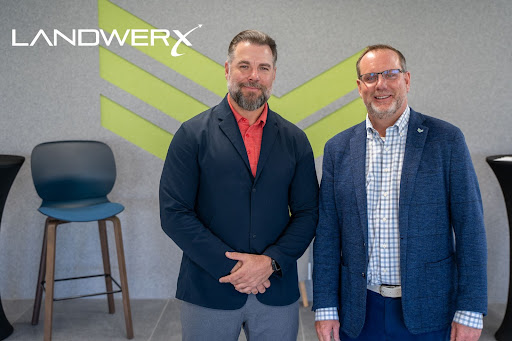Iowa farmers will get a hand in finding solutions to some of their biggest challenges under a new, innovative partnership between Landus Cooperative and Defensewerx, a nonprofit that is the world’s largest innovation ecosystem serving the nation’s leading national security, defense and intelligence communities.
Through the partnership with Landus, Defensewerx, an intermediary known for solving problems through its international network of people, businesses, academic, and nongovernmental and government agencies, created Landwerx, an agricultural innovation hub based at the Landus Innovation Connector in Des Moines.
The new partnership will bring that international network of expertise to the table to help solve some of agriculture’s most pressing problems, leaders of both organizations said after the joint venture was announced on May 4.
“We’ve had 30 to 50 farmers involved in this since the beginning and it’s been really eye-opening to us what a traditional agriculture business feels their need is,” said Matt Carstens, president and CEO of Landus, the state’s largest farmer-owned cooperative. “There are issues around health insurance and sustainability, and downstream engagement with that consumer through sustainability. All that was on the majority of farmers’ minds. So the commonality is very high.”
Other challenges could range from addressing labor shortages to improving equipment and addressing deficiencies in infrastructure, among others.
Carstens said not every farmer will need every solution, but Landus will not bring an issue to Landwerx until at least 50% of its customers identify what is needed.
Carstens said investment funding and reducing health insurance costs are two of the biggest issues identified by farmers.
“Farmers are paying somewhere between $20,000 and $50,000 a year” on health insurance, he said.
Brad Chedister, chief technology and innovation officer of Defensewerx, will serve as the principal innovation adviser for Landwerx. What Landwerx will do is take a challenge identified by farmers and tap into its innovation ecosystem to see if a solution already exists. If not, it will provide opportunities for a company or individual to develop a solution, Chedister said.
“We’ve painstakingly built this ecosystem of 140,000-plus innovators, makers, doers, industry, government, academia, historically Black colleges or universities, hackers, people who wouldn’t normally work in this space, we’ve lowered the barrier of entry to make it easy for them to work here,” Chedister said.
Initial funding for Landwerx is through Landus, but Landwerx will also seek and apply for federal and state grants, as well as seek funding from partner organizations that may be working on developing solutions to problems through the organization’s ecosystem.
Carstens said Landwerx is already working on the health insurance challenge.
“They brought us a company that we didn’t know existed, and we started having discussions with them and they reached out to some larger players and smaller players,” he said. “We found some options that are very traditional in coverage that should be beneficial and we found some nontraditional insurance that will be beneficial for some of our farmers.”
“It’s a great example that we’re excited to bring forward in the months to come,” Carstens said. “It’s a huge issue for our farmers, and it’s unacceptable that farmers should not have access to good health care that is affordable. We need to push the envelope of what’s possible and look beyond and help be a part of that as their cooperative.”
Chedister said Landwerx and its ecosystem don’t just provide innovation around product development, but also innovation around processes.
That ecosystem includes the Defence Innovation Alliance for Northern Atlantic, which is made up of 38 nations and is one of the largest venture capitalist and private equity conglomerates in the world, he said.
Carstens said the ecosystem isn’t just about equipment, data or technology.
“It’s about any issue that ag has,” he said. “Ag is land, food, fuel security, and that is national security. So when you bring these together, what a powerful source we have.”
He said the partnership with Landwerx can be a game-changer for agriculture.
“Agriculture, like many industries, is stuck in a lot of things for profit, for stuff, for shareholders, for something other than the core,” Carstens said. “That’s what this has got to be focused on. If a company can make money off it, God bless, but we have this whole thing in ag reversed. The funnel is upside down. We’ve got to reverse this and get to where it really matters.”
And he said where it matters is where it can help the farmer and eventually the consumer.
Carstens said he thinks the Landwerx partnership can be a model that is emulated by other industries around the world. Chedister said the concept is “absolutely repeatable.”
“We started with an innovation hub, and now we’re the world’s largest collective of innovation hubs and supportive initiatives,” he said. “This is a proof of concept that is going to be successful based on case studies that have already been successful. This proof of concept is based on a lot of baseline architecture [that has been] built up and successful.”
